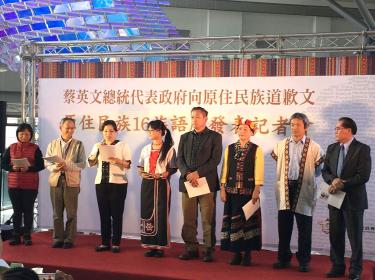Apology to be published in 18 languages
LONG AWAITED:Tsai’s formal apology is thought to be the first given to indigenous people in the Asian region by a head of state, and is considered a first step
By Wu Po-wei and Jake Chung / Staff reporter, with staff writer
Following President Tsai Ing-wen’s (蔡英文) closely watched apology to Aborigines in August, the Council of Indigenous Peoples announced plans to publish a full text of the apology in 18 languages, including 16 officially recognized Aboriginal languages, as well as English and Japanese.
Council Minister Icyang Parod told a news conference in New Taipei City on Wednesday that Tsai’s apology, made on behalf of the government for the discrimination and neglect of Aborigines over the past 400 years, was not only the first step toward reconciliation and peace, but also the first time any head of state in the Asian region has offered an apology to Aborigines, adding that it was historically significant for Indigenous peoples.
The apology, made on Aug. 1, Indigenous People’s Day, was given in Mandarin after a ceremony in front of the Presidential Office Building in Taipei, if front of representatives of Taiwan’s 16 recognized Aboriginal communities.
The council assembled a team of 48 translators and linguistic experts to translate the text into 16 Aboriginal languages so that more people could understand the content of the apology.
This took four months to complete, Parod said.
The translated scripts are given with the original text in each version, with pictures of Aboriginal representatives, as well as pictures from the event featuring Tsai, Parod said.
“We plan to publish them soon, which is not only a step toward implementing historical justice and transitional justice for Aborigines, but could also elevate the status of the Aboriginal languages,” Parod said.
It is also the first time that the nation has published an important government document in Aboriginal languages, Parod said, adding that the documents show that the government wants to conserve and advance Aboriginal languages.

